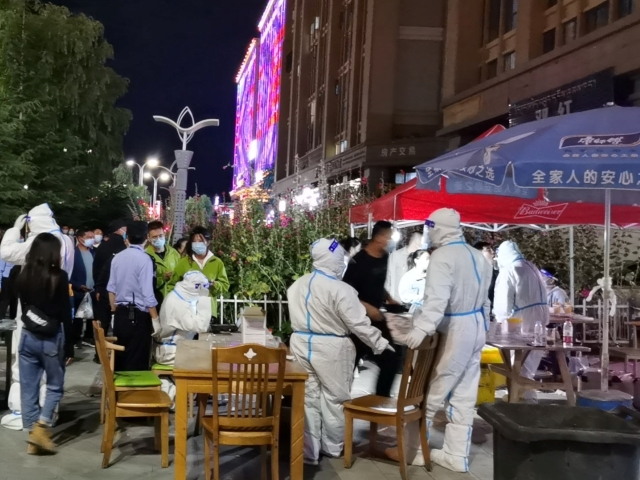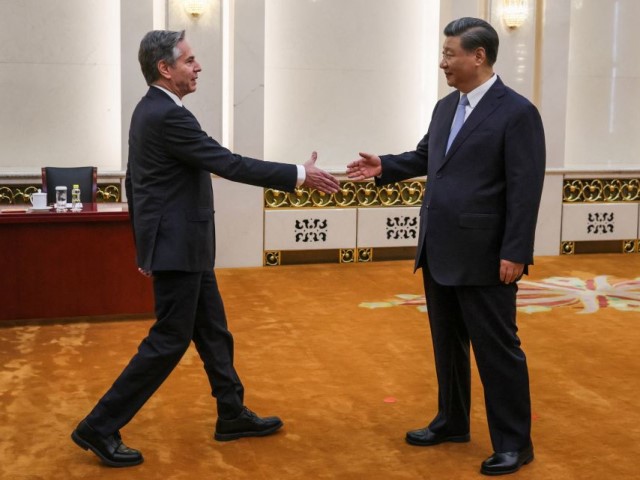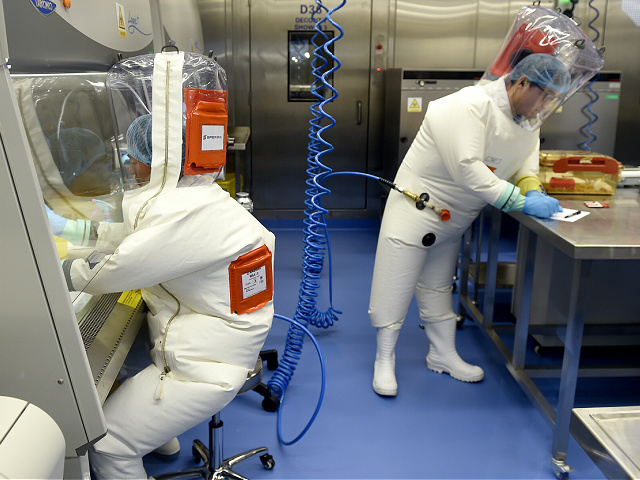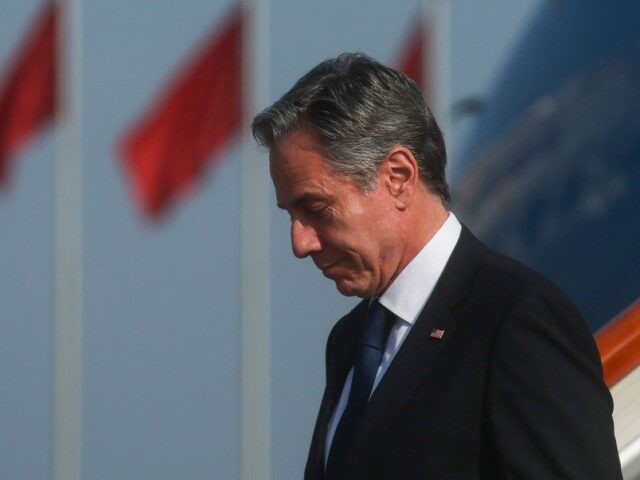Secretary of State Antony Blinken told reporters following talks with genocidal Chinese dictator Xi Jinping in Beijing on Monday that the U.S. government was “prepared to cooperate” with China on “public health” projects, among other interests.
Blinken emphasized that the government of leftist American President Joe Biden prioritized communication with the Communist Party and had sent him to Beijing, in part, to “explore areas where we might work together when our interests align on shared transnational challenges.” Other areas of cooperation Blinken listed included “climate” and “counternarcotics.”
China is the world’s worst polluter, responsible for the vast majority of carbon dioxide emissions and greatly expanding its coal energy supply, as well as taking the crown of the world’s most prominent dumper of trash in the ocean.
Communist China is also believed to be the source of most ingredients used to make the deadly opioid fentanyl, which is responsible for an ongoing death wave across the United States. It dodges responsibility by claiming that Chinese companies do not produce fentanyl on Chinese soil – even when law enforcement operations source the base ingredients of fentanyl produced in countries such as Mexico back to China.
On public health, China has faced a barrage of global criticism after being identified as the origin of the Wuhan coronavirus, a highly contagious pathogen that fueled a years-long pandemic that has killed millions since early 2020 and continues to kill today.

LHASA, CHINA: Medical workers in PPE test people during the Covid-19 screening in Lhasa city in west China’s Tibet Autonomous Region Tuesday, August 9, 2022. (Su Ping/ Feature China/Future Publishing via Getty Images)
The coronavirus pandemic prompted experts around the world to condemn China’s public health policies, including allowing a banquet of 130,000 people to take place while knowing of the spread of a contagious disease, arresting doctors for recommending hand-washing in the early days of the pandemic, and abruptly forcing millions across the country under house arrest without food or medicine.
Blinken did not elaborate on the nature of public health collaboration that he had brokered in meetings with communist leaders in Beijing, but the issue was mentioned in passing in multiple State Department publications on Monday.
One such publication was a statement by State Department spokesman Matthew Miller on Blinken’s visit to China, which included talks with Foreign Minister Qin Gang and top Politburo official Wang Yi in addition to Xi.
“The two sides underscored that the United States and China should work together to address shared transnational challenges, such as climate change, global macroeconomic stability, food security, public health, and counter-narcotics,” Miller wrote. “The Secretary encouraged further interaction between our governments on these and other areas, which is what the world expects of us.”
Blinken also told reporters about potential public health projects following his meeting with Xi at a press conference on his visit.
“As we work to address our differences, the United States is prepared to cooperate with China in areas where we have mutual interests, including climate, macroeconomic stability, public health, food security, counternarcotics,” Blinken told reporters, according to a State Department transcript of his remarks.

US Secretary of State Antony Blinken (L) shakes hands with China’s President Xi Jinping in the Great Hall of the People in Beijing on June 19, 2023. (Leah Millis/Pool/AFP via Getty Images)
Later on in the event, he repeated, “This was an opportunity to explore areas where we might cooperate in the interests of our own people, in the interests of people around the world – on climate, on global economic stability, on global health, on fentanyl, as I mentioned – on exchanges, actually, between our people.”
Blinken did not elaborate on the public health remarks, nor did reporters ask, according to the transcript.
The Secretary of State generally described the visit – reportedly postponed in February following the Chinese spy balloon scandal – as an attempt to restore communication for its own sake, rather than make substantive progress on any particular issue.
“I came to Beijing to strengthen high-level challenges of communication, to make clear our positions and intentions in areas of disagreement, and to explore areas where we might work together when our interests align on shared transnational challenges,” Blinken explained. “And we did all of that.”
“In every meeting, I stressed that direct engagement and sustained communication at senior levels is the best way to responsibly manage our differences and ensure that competition does not veer into conflict,” he added, “And I heard the same from my Chinese counterparts. We both agree on the need to stabilize our relationship.”
Blinken claimed that, in addition to discussing “de-risking” but not “decoupling” the Chinese-American economic relationship, cooperation on climate change, and “people-to-people exchanges,” he also mentioned human rights in passing.
“The United States and the international community remain deeply concerned about PRC human rights violations, including in Xinjiang [East Turkistan], in Tibet, and Hong Kong,” Blinken said.
Under Xi, China is currently engaging in a genocide of ethnic Turkic people, the majority of which are Uyghur, in East Turkistan and ethnically cleansing the population of Tibet, both occupied regions with few political ties to Han-majority Beijing in history prior to the communist conquests. Chinese Foreign Ministry readouts of Blinken’s various meetings did not mention the Uyghur genocide, which China denies.
The United States has engaged for decades in cooperation on public health research projects with communist China.
“From FY 2015 to 2021, federal agencies provided $28.9 million directly to Chinese entities for research and development activities,” the U.S. Government Accountability Office (GAO), the Congressional watchdog agency, noted in September. “For example, the Centers for Disease Control and Prevention and National Institutes of Health awarded funds to China for drug development and vaccination studies. This funding resulted in scientific articles, data collection systems, and international workshops.”
The Harvard School of Public Health maintains one of America’s most prolific cooperation agreements with China, the Harvard China Health Partnership, formalized in 2018. The project links America’s top university to the communist-controlled Chinese Academy of Social Sciences and institutions such as Tsinghua University, Xi Jinping’s alma mater.
“Over the past four decades, ties between Harvard Chan researchers and peers across China have grown increasingly close,” the school explains on its website. “Harvard faculty guided and assisted China in establishing the field of health policy and management, while also training the first generation of Chinese molecular biologists in public health. The School’s work with academic and government partners has resulted in numerous cooperative endeavors in research, education, academic exchange, and network building.”
Harvard’s collaboration with China has continued even after the discovery that one of its now-former professors, Charles Lieber, had secretly joined China’s “Thousand Talents” program for undisclosed payments in the hundreds of thousands of dollars and worked as a “strategic scientist” for the Wuhan University of Technology, potentially compromising critical research.
The direct U.S.-China scientific research described by the GAO has also continued even as American public health institutions face scrutiny for controversial research at the Wuhan Institute of Virology (WIV), which many have speculated may have been the origin of the Wuhan coronavirus pandemic.
The National Institutes of Health (NIH) reportedly funded gain-of-function research, which strengthens the ability of a pathogen to sicken people or makes it more contagious, at the WIV. One such experiment reportedly concerned a bat coronavirus that was altered to become more infectious.
The NIH claimed the organization it funded did not tell its officials about that particular experiment. In May, the taxpayer watchdog group White Coat Waste Project (WCW) revealed the NIH had removed the WIV from its list of institutions eligible for funding for animal experiments.

In this photo taken Thursday, Feb. 23, 2017, researchers work in a lab of the Wuhan Institute of Virology in Wuhan in central China’s Hubei province. (Chinatopix via AP)
The origin of the Wuhan coronavirus remains an unsolved mystery. The World Health Organization (W.H.O.), which dismissed the possibility of WIV involvement in 2021, dramatically proclaimed this year that “all hypotheses,” including an accident at the WIV, were “on the table” because China had failed to offer enough information for the agency to dismiss that possibility.
A State Department fact sheet published in January 2021 stated that Washington had “reason to believe that several researchers inside the WIV became sick in autumn 2019, before the first identified case of the outbreak, with symptoms consistent with both [Chinese coronavirus] and seasonal illnesses.”
The official stance of the Chinese government is that the Wuhan coronavirus originated at a U.S. Army facility in Fort Detrick, Maryland, and the American government covered up initial cases by misdiagnosing them as “lung injuries” from e-cigarettes. Beijing has offered no evidence for this theory and has yet to explain how such a misdiagnosis would be possible without documented cases of health workers becoming ill, given that the Wuhan coronavirus is highly contagious and lung injuries are not.

COMMENTS
Please let us know if you're having issues with commenting.